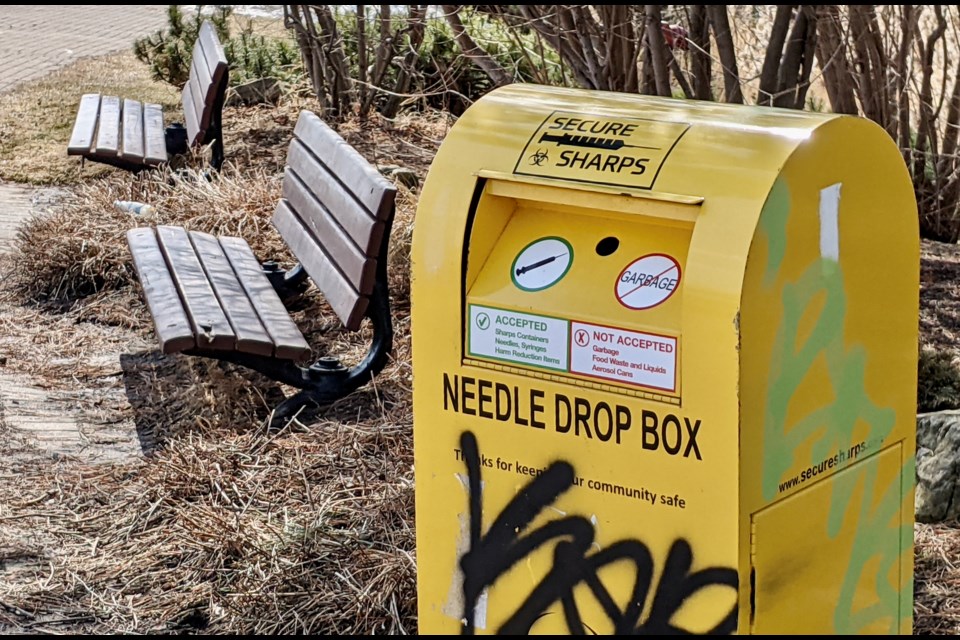The Naloxone kits stay, the needle collection kiosks go.
City councillors will consider a motion to that effect Monday.
Barrie Fire Chief Cory Mainprize says the cost to lease and collect from the needle kiosks is about $25,000 annually, but his recommendation to discontinue them is not based on funding.
“Predominantly what we’ve seen as we’ve gathered approximately 18 months of data now is the program does not seem successful,” he said. “The bins (kiosks) are continually being stuffed with garbage. We empty them every single month…they’re so full of garbage, even if people wanted to put needles in them, they couldn’t.
“There appears to be a very, very low collection rate.”
In November, 2020 council approved a motion to use city resources to support the Simcoe Muskoka opioid strategy and address the overdose crisis. The methods were to implement several needle exchange bins within Barrie parks or parking lots on a pilot basis, in addition to containers already located with the park washrooms, and install nasal spray Naloxone kits as part of a one-year pilot inside city facilities near publicly accessible automated external defibrillators (AEDs) for public use.
Needle collection kiosks were installed in eight locations; Heritage Park, Queen’s Park, at the rear of Collier Street Parking Garage, 83 Perry St. at the west entrance to Milligan’s Pond, Sam Cancilla Park, Stephens Park, Kearsey Park and Berczy Park.
The city received monthly reports on the total weight collected from each kiosk, but collection and weighing were unable to differentiate between the weight of the collected needles and that of other products disposed of in the kiosks.
Photographs showed the kiosks were often contaminated and contained significantly more garbage than used needles.
Several of the kiosks have also been vandalized. Mainprize said some aren’t in plain view, which makes them more prone to damage than normal garbage cans or recycling bins.
“They get tipped over, smashed,” he said.
Coun. Natalie Harris said she is of two minds about the motion councillors will consider Monday.
“I’m very happy to hear that there is a recommendation to continue the public access naloxone project, and disappointed to learn that the needle collection kiosks have not been used for their intended purpose” she said.
“I would like to investigate other kiosk designs which may provide more control over what is collected in these bins. I am happy though to hear that the needle collection kiosks near CMHA (Canadian Mental Health Association) and SMDHU (Simcoe Muskoka District Health Unit) buildings are being used for their intended purpose.”
City staff have reported significant numbers of needles on the ground near the kiosks, and no notable decrease in the number of discarded needles in the parks.
“They haven’t seen any reduction in needles that they’re finding in the parks,” Mainprize said. “If anything, they’re seen more needles around the bins than in the bins, creating additional hazards because they have to be cleaned up.
“It is only 18 months, which isn’t a huge time, but we really haven’t been seeing any change at all,” he said. “They’re either completely empty or completely stuffed with garbage.”
The cost to lease the kiosks, and continue the monthly collection, is approximately $25,000 a year. No funds have been allocated to continue the pilot program after April 2022.
City staff managed the installation and supplied the Naloxone kits, with 27 kits installed inside 19 facilities that have public access defibrillators and meet the Naloxone storage requirements.
The first kit was installed in the Transit Terminal in May of 2021. Naloxone from city-installed kits has been administered on two occasions inside a city facility since the start of the pilot program. It contributed to the reversal of the overdoses that had occurred.
“We have had some success with it and it’s already in place and paid for,” Mainprize said.
As the kits and containers have already been acquired, the ongoing cost of the Naloxone kit program can be managed through the existing operational budget. Ongoing costs are associated with replacement of used or expired Narcan nasal spray, the one-way breathing barrier, the non-latex gloves and instructions for administering the Narcan. No additional funding is required to address these supplies.
Naloxone is a fast-acting drug used to temporarily reverse the effects of opioid overdoses, says Health Canada, and can restore breathing within two to five minutes.
Monday’s motion is that the Naloxone kit pilot program for the provision of publicly accessible kits in city facilities be adopted as a permanent city program, but that the needle collection kiosk pilot program be discontinued.
If approved Monday, the motion will be considered for final approval at the March 28 city council meeting.



